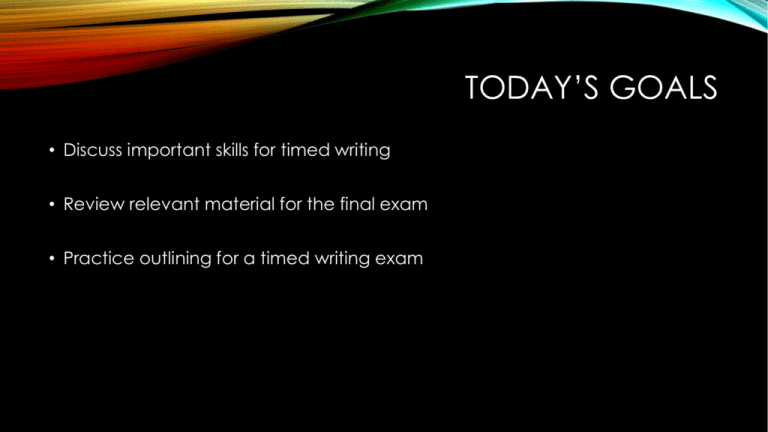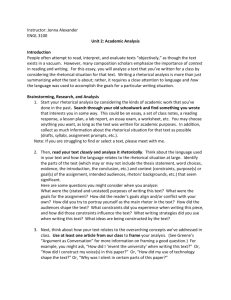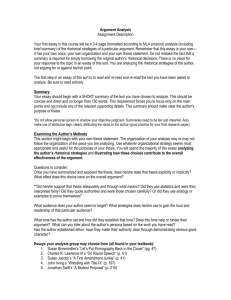Week 6 Day 1 PowerPoint – U11B Section
advertisement

TODAY’S GOALS • Discuss important skills for timed writing • Review relevant material for the final exam • Practice outlining for a timed writing exam SYNTHESIS ESSAY THESIS • Original, original, original • Related to the topics of the articles you have reviewed without repeating their ideas • Does not need to mention the articles you will analyze (do this in your forecasting) • Make it arguable and not just a statement; this will aid you when providing support for your thesis • It may help to focus on a thesis question which your thesis statement will answer. This thesis question can also serve as a powerful tool to hook readers in your introduction • Should likely appear in one of the first 1-2 paragraphs of your essay SYNTHESIS ESSAY FORECASTING • DOES need to mention all articles you will be summarizing • Must also mention the supporting points you will use to argue for your thesis • Should occur almost directly after your thesis • You must summarize three articles in the body paragraphs of your essay. These are the sources that must be forecasted. You may use additional sources for supporting information, but these sources do not need to be summarized or forecasted (although you must cite them normally) TIMED WRITING SKILLS • Ability to store and access appropriate knowledge into an organized essay • Ability to quickly analyze the specific requirements of an exam question • Ability to deal with pressure, text anxiety, and time constraints TIMED WRITING KEY TERMS • See pg 600 • Analyze, apply, argue, compare, contrast, construct, critique, define, discuss, enumerate, evaluate, explain, identify, illustrate, prove, review, summarize, and trace • Each key term has specific response strategies and tells you the type of information you should include in your response IMPORTANT STRATEGIES FOR SUCCESS • Follow directions! • Have a clear and strong thesis • Have coherent organization with transitions • Support each part of your argument with evidence (rhetorical appeals can be helpful here) • Have an independent analysis and argument. Be original. • Have a conclusion. It need not be long or fancy but should recapitulate your important points GROUP ACTIVITY 1: ANALYZE ESSAY QUESTIONS • In your synthesis topic groups • Read the passage on page 603 and questions on pg. 604 • Determine which of the four questions best fits the essay and provide an explanation (3+ sentences using examples from the text) as to why MOST IMPORTANT CONCEPTS • Angle of Vision • Rhetorical Context: • Purpose • Audience • Genre • Rhetorical Appeals • Ethos • Pathos • Logos FINAL EXAM REVIEW Rhetorical Concept Literacy Narrative Genre Open form, concrete language, autobiographical narrative, implicit theme Audience Students at fiu, your peers, professor, informal audience, Purpose Tell a story about who you are Angle of Vision Lessons we’ve learned, important events, settings, characters. Leave out embarrassing details, unimportant events Ethos True Story about you. Pathos Emotions you’re feeling, descriptive language, relatable problem and resolution Logos Dates, specific descriptions/details. Weakest appeal in literacy narrative FINAL EXAM REVIEW Rhetorical Concept Strong Response Genre Closed form. Thesis driven. Strong argument/reaction. Transitions. Blended strong response: rhetorical analysis, ideas critique, reflection Audience Teachers and professors. Educated ppl. More formal Purpose Agree/disagree with article. Rhetorical analysis. Support argument with details. Provide own ideas/exp Angle of Vision Elements that support your argument. Leave out counterarguments Ethos Quote the author, personal experience with the issue Pathos Word choice. Examples from the article. Real life events. Logos Examples from article. Quoting statistics/dates. FINAL EXAM REVIEW Rhetorical Concept Synthesis essay Genre Closed form. Very formal. Persuasive/research writing. Thesis driven. Academic conversation Audience Academic conversation with writers. Professors, educated ppl, writers Purpose Provide your own viewpoint in academic conversation, persuade, analyze/summarize Angle of Vision Details that support argument. Leave out personal experiences/first person. Don’t state thesis/ideas too strongly Ethos Credible sources, quotes from articles, research Pathos Examples from sources, imagery. Weakest appeal here. Logos Dates/statistics/facts from sources. Logical GROUP ACTIVITY : TIMED WRITING PRACTICE • In the same groups • Read the two example essay prompts on page 607 and prompt 3 at the end of this slide • Create a detailed outline for each prompt. Make sure to include: a thesis, forecasting, and the main points of your supporting paragraphs • (You do not need to write a full essay, just the outline) • Prompt 3: During the course of the class, we have discussed how all writing has a rhetorical context that affects its form and content. Discuss and illustrate how the three elements of rhetorical context have shaped the essays we have written in this class. Be sure to include specific examples with quotes from each of the major essays. HOMEWORK • Read A&B 595-608 (optional) • Continue working on Synthesis essays • Review concepts we discussed in class for final exam • Angle of Vision • Rhetorical Context: • Purpose • Audience • Genre • Rhetorical Appeals • Ethos • Pathos • Logos • Portfolio: Final Draft • Bring to the final exam on Friday (you will need it for the exam) • It should contain your: literacy narrative, strong response essay, and synthesis essay draft





